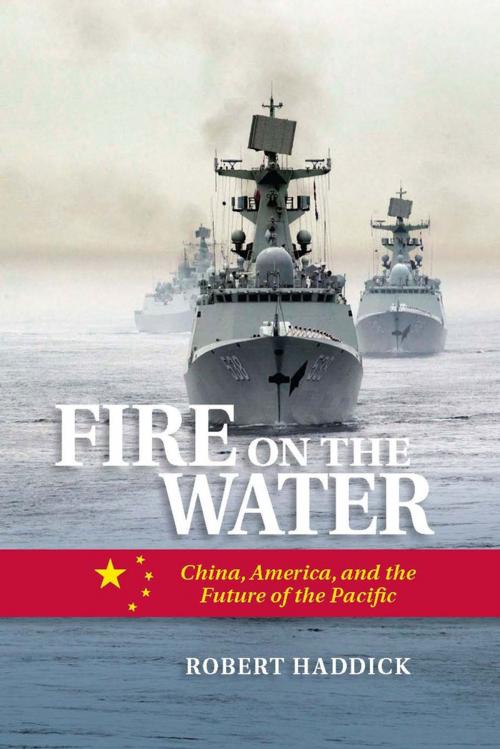Fire on the Water
China, America, and the Future of the Pacific
Nonfiction, History, Military, Strategy| Author: | Robert Haddick | ISBN: | 9780870210600 |
| Publisher: | Naval Institute Press | Publication: | September 15, 2014 |
| Imprint: | Naval Institute Press | Language: | English |
| Author: | Robert Haddick |
| ISBN: | 9780870210600 |
| Publisher: | Naval Institute Press |
| Publication: | September 15, 2014 |
| Imprint: | Naval Institute Press |
| Language: | English |
The main theme of Fire on the Water is that conventional measures of military balance, employed by both the general public and many policy experts, underestimate the threat that China’s military modernization poses to the U.S. position in the Asia-Pacific region. Within a decade, China’s leaders will have the military power to hold at risk U.S. interest in East Asia. The U.S. needs to fashion a new and competitive strategy, one that better matches the strengths of the U.S. and its allies against China’s vulnerabilities, in order to maintain a balance of power in the region and convince China’s leaders to pursue a cooperative course.
It is not obvious to many observers why a conflict in the region is plausible, or why the U.S. should bear the responsibility for maintaining a forward military presence in the region. China has rapidly emerged as a great power and by doing so, has acquired many vital interests around the world. Following the pattern set by other such episodes in history, China is also acquiring the military means to protect its new interests, a development that puts at risk the interests of China’s neighbors and the United States. The U.S. forward military presence in the region is an increasingly difficult burden to sustain. But in the long run, this approach will be less costly and less risky than encouraging China’s neighbors to balance China by themselves, an alternative that will very likely result in an unstable arms race and a conflict that will damage America’s interests.
While it will be in America’s interest to maintain its position in the Asia-Pacific region, China’s military modernization is making it much more difficult for the U.S. to do so. China’s military strategy, centered on its rapidly-expanding land-based and anti-ship missile forces, is exploiting weaknesses in long-standing U.S. force structure and doctrine. Due to a variety of institutional barriers, the U.S. has been slow to adapt to China’s military modernization. Current efforts to respond are impractical, in that they expend U.S. resources against China’s strengths rather than its vulnerabilities.
The U.S. needs a new and competitive strategy that will strengthen its alliances in the region and convince China’s leaders that cooperation, rather than military expansion and an attempt at regional hegemony, will be China’s best course. Fire on the Water proposes reforms to U.S. diplomacy, military programs, and strategy that will offer a better chance at preserving stability. The goal of these reforms is to thwart China’s well-designed military modernization plan, bolster the confidence and credibility of U.S. alliances in the region, and thus persuade China’s leaders that China’s best course is cooperation rather than conflict, the outcome that has usually occurred in history when a new great power has rapidly emerged.
The main theme of Fire on the Water is that conventional measures of military balance, employed by both the general public and many policy experts, underestimate the threat that China’s military modernization poses to the U.S. position in the Asia-Pacific region. Within a decade, China’s leaders will have the military power to hold at risk U.S. interest in East Asia. The U.S. needs to fashion a new and competitive strategy, one that better matches the strengths of the U.S. and its allies against China’s vulnerabilities, in order to maintain a balance of power in the region and convince China’s leaders to pursue a cooperative course.
It is not obvious to many observers why a conflict in the region is plausible, or why the U.S. should bear the responsibility for maintaining a forward military presence in the region. China has rapidly emerged as a great power and by doing so, has acquired many vital interests around the world. Following the pattern set by other such episodes in history, China is also acquiring the military means to protect its new interests, a development that puts at risk the interests of China’s neighbors and the United States. The U.S. forward military presence in the region is an increasingly difficult burden to sustain. But in the long run, this approach will be less costly and less risky than encouraging China’s neighbors to balance China by themselves, an alternative that will very likely result in an unstable arms race and a conflict that will damage America’s interests.
While it will be in America’s interest to maintain its position in the Asia-Pacific region, China’s military modernization is making it much more difficult for the U.S. to do so. China’s military strategy, centered on its rapidly-expanding land-based and anti-ship missile forces, is exploiting weaknesses in long-standing U.S. force structure and doctrine. Due to a variety of institutional barriers, the U.S. has been slow to adapt to China’s military modernization. Current efforts to respond are impractical, in that they expend U.S. resources against China’s strengths rather than its vulnerabilities.
The U.S. needs a new and competitive strategy that will strengthen its alliances in the region and convince China’s leaders that cooperation, rather than military expansion and an attempt at regional hegemony, will be China’s best course. Fire on the Water proposes reforms to U.S. diplomacy, military programs, and strategy that will offer a better chance at preserving stability. The goal of these reforms is to thwart China’s well-designed military modernization plan, bolster the confidence and credibility of U.S. alliances in the region, and thus persuade China’s leaders that China’s best course is cooperation rather than conflict, the outcome that has usually occurred in history when a new great power has rapidly emerged.















